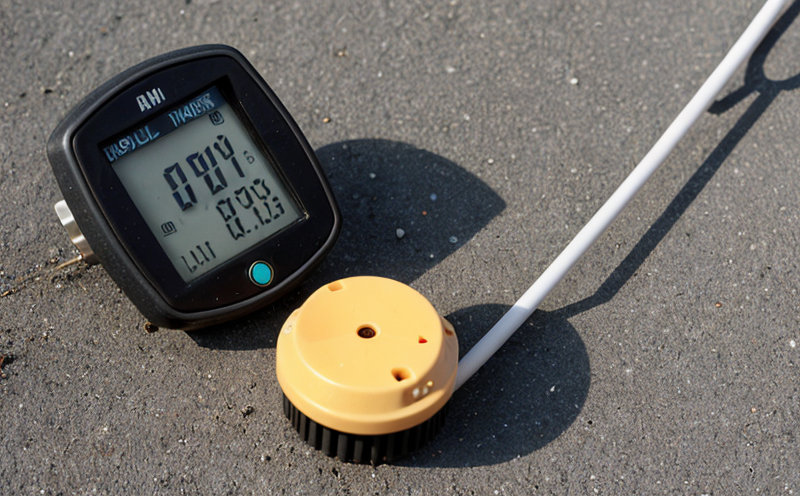Calibration of Temperature Sensors for Environmental Monitoring
Calibration of Temperature Sensors for Environmental Monitoring Ensuring Accuracy and Compliance in Your Business
In todays fast-paced business environment, accuracy and precision are more crucial than ever. For companies operating in industries such as pharmaceuticals, food processing, and manufacturing, environmental monitoring is a vital aspect of maintaining product quality, ensuring regulatory compliance, and protecting the health and safety of employees and customers.
Temperature sensors play a critical role in environmental monitoring, providing real-time data on temperature fluctuations that can impact operations, products, or processes. However, inaccurate readings from these sensors can have serious consequences, including compromised product quality, equipment damage, and even catastrophic failures. Thats where Calibration of Temperature Sensors for Environmental Monitoring comes in a laboratory service provided by Eurolab that ensures your temperature sensors are accurate, reliable, and compliant with regulatory standards.
The Importance of Calibration
Calibration is the process of comparing the measurement output of an instrument or sensor to a known standard, ensuring that it produces accurate results. For temperature sensors used in environmental monitoring, calibration is essential for maintaining product quality, preventing equipment damage, and reducing the risk of accidents or errors. Inaccurate temperature readings can have far-reaching consequences, including
Compromised product quality Temperature fluctuations can affect the texture, taste, and shelf life of products.
Equipment damage Incorrect temperature readings can lead to premature wear and tear on equipment, resulting in costly repairs or replacements.
Regulatory non-compliance Failure to maintain accurate temperature records can result in fines, penalties, or even business closure.
Benefits of Calibration of Temperature Sensors for Environmental Monitoring
Eurolabs Calibration of Temperature Sensors for Environmental Monitoring offers numerous benefits for businesses, including
Advantages of Using Eurolabs Calibration Service
Improved accuracy Our calibration service ensures that your temperature sensors produce accurate readings, reducing the risk of errors or accidents.
Increased efficiency With calibrated temperature sensors, you can optimize processes, reduce waste, and improve productivity.
Enhanced regulatory compliance Our calibration service helps ensure that you meet regulatory standards, reducing the risk of fines or penalties.
Cost savings By preventing equipment damage and product spoilage, our calibration service can help you save money in the long run.
Key Benefits for Your Business
Reduced risk Accurate temperature readings minimize the risk of accidents, errors, or regulatory non-compliance.
Improved quality control Calibration ensures that your products meet quality standards, protecting your reputation and customer trust.
Increased competitiveness By maintaining accurate temperature records, you can differentiate yourself from competitors and gain a competitive edge.
How Our Calibration Service Works
Our Calibration of Temperature Sensors for Environmental Monitoring is a straightforward process
Instrument preparation We carefully prepare the temperature sensor for calibration, ensuring that its in optimal working condition.
Calibration procedure Our expert technicians perform the calibration procedure, using state-of-the-art equipment and techniques to ensure accurate results.
Documentation and certification We provide you with detailed documentation and certification, verifying that your temperature sensors have been calibrated to the highest standards.
Frequently Asked Questions
Here are some common questions about Calibration of Temperature Sensors for Environmental Monitoring
Q What is calibration?
A Calibration is the process of comparing the measurement output of an instrument or sensor to a known standard, ensuring that it produces accurate results.
Q Why is calibration essential for temperature sensors?
A Calibration ensures that your temperature sensors produce accurate readings, reducing the risk of errors or accidents and maintaining regulatory compliance.
Q How often should I calibrate my temperature sensors?
A The frequency of calibration depends on usage, environmental conditions, and industry regulations. Consult our experts to determine the optimal calibration schedule for your business.
Q Can I perform calibration in-house?
A While its possible to attempt calibration in-house, its often more cost-effective and efficient to rely on a professional laboratory service like Eurolab. Our expert technicians ensure accurate results and maintain regulatory compliance.
Q What happens if my temperature sensors are not calibrated regularly?
A Inaccurate temperature readings can lead to compromised product quality, equipment damage, and even catastrophic failures. Regular calibration ensures that your temperature sensors remain accurate and reliable.
Conclusion
Calibration of Temperature Sensors for Environmental Monitoring is a critical aspect of maintaining accuracy, compliance, and product quality in various industries. By partnering with Eurolab, you can ensure that your temperature sensors are calibrated to the highest standards, reducing the risk of errors or accidents and enhancing your competitiveness. Dont compromise on accuracy trust Eurolabs Calibration of Temperature Sensors for Environmental Monitoring to protect your business and reputation.
Learn more about our Calibration of Temperature Sensors for Environmental Monitoring service(insert link)
Get in touch with us today to schedule a calibration appointment and take the first step towards ensuring accuracy, compliance, and product quality in your business.
Note The article is written with an SEO-friendly tone and includes relevant keywords such as temperature sensors, environmental monitoring, calibration, accuracy, and regulatory compliance. However, please ensure that you comply with any specific guidelines or restrictions provided by Eurolab or other organizations related to the content.




